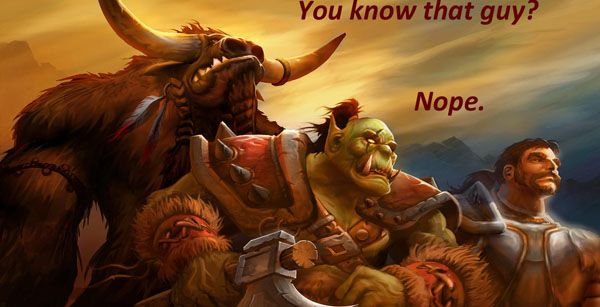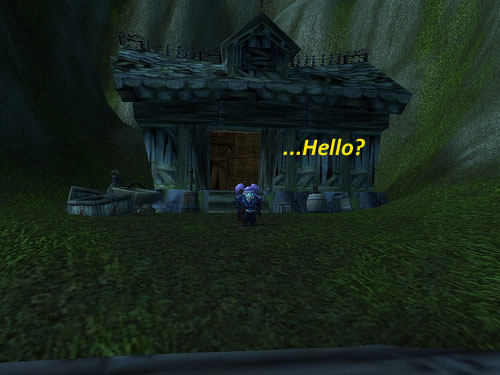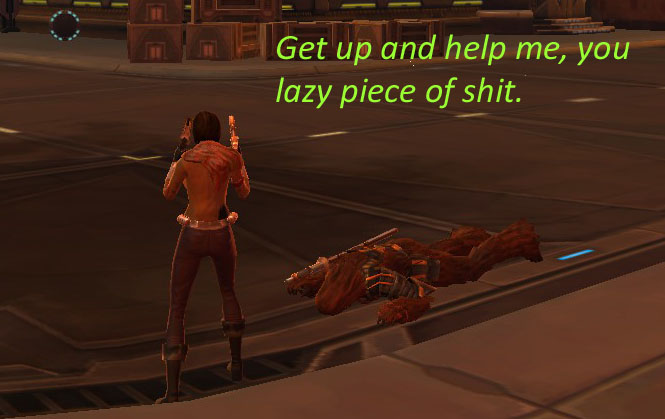The Second M

The premise behind any MMORPG is pretty simple: Get a bunch of similarly-interested people together, stick them on a server and watch the pot boil as they grind and quest and level their way up the seemingly never-ending ladder of in-game objectives and exploration. The great thing – or worst thing, depending on your perspective – about any MMO is that second M: the Multiplayer aspect. But what happens if you don’t necessarily need that all-important feature?
There are roughly a gabillion people worldwide who play MMORPGs* like World of Warcraft, Rift, Aion, and Star Wars: The Old Republic. For most of these players, having some form of social connection, even ambient connection to others is one of the draws of the experience. The general chat on any server will be populated by people discussing various things, some not even game-related. For many, MMOs have become their social stomping ground, kind of like their favorite bar where they hang out and chat with their buddies.
Other players, while not so inclined to contribute to the general chat parties (aside from the occasional question or comment) will gladly accept the random help of a stranger aiming to win the same boss fight or complete the same task. These folks are also not likely to be shy about asking strangers to form up a group for whatever purpose. I personally tend to fall into this category; I enjoy playing solo or with my friends who have come online but also value the chance encounters with other quest-focused folks that usually end fairly quickly and with the requisite amount of polite interaction.
I interact with others mainly because I feel as though I am supposed to. It is a multiplayer game after all and convenience sometimes dictates that I’ll need a hand with something, especially if I’m too lazy to simply level far enough to take care of it on my own. But I have noticed myself falling into a trap of late – one which could conceivably change the dynamic of MMOs forever. It is a trap of a lulling sense of social interaction, even where there is none.

MMOs have changed quite a bit in the last couple of years. The Cataclysm expansion to World of Warcraft introduced many upgrades. Story-wise, there were now fully-realized plotlines that actively changed the world around the player as they finished certain quests. The result was a game that felt more reactive, more story-driven and plotline-based rather than a static world with simplified and ambiguous lore. Star Wars: The Old Republic took the same steps in enriching their world with a rich and detailed story environment but in gameplay, it’s bringing the MMO to a new level.
It is indeed still a social MMO style game, but one could argue that you don’t even really need multiplayer at all. The story is still quest-based but is even more plot-driven, complete with voiced characters, mission cut scenes, companions, and even romance. If one were to simply take the entire social aspect out of the game, we would still have a delightful single player experience.
With the addition of non-player companions in SWTOR, there is the illusion of friendship and social interaction even while playing alone. Certain classes in Warcraft always had built in companions such as demon minions or a pet they could summon, but it was only recently with the new expansion that it was made much easier to solo these classes.
Why spend time grabbing one more person for your quest when you already have a pet wolf to send into battle? Why find and wait for another person when there is a Wookiee following you around, ready to do whatever you tell him to do? Why toggle the “looking for group” icon when the player has a cute blonde trooper watching their every move and healing them after every single scrape? The companions exist as a convenience meant to lend a helping hand to anyone who needs it. There will always be times when a player might not be able to get a group together (or might not want to) and that can leave you stuck at a frustrating spot in the game, unable to progress. Having your own personal Wookiee makes these situations a lot easier to avoid.

But this also makes the “real” people playing much easier to avoid. It raises the question: are people playing MMOs strictly for the social aspect, or are the new features of these games making it more of a single player experience? Is the focus shifting from one of teamwork to one of subtle isolation? If a player keeps to themselves the majority of the time, just how much does he or she even notice the other players around them? What happens when the extent of the social interaction in a multiplayer game is merely noticing that another person is there, or completing a transaction at the auction house?
Players are demanding more of their MMOs of late. They want story. They want characters. The simplicity of the grind, the meditative tasks of crafting items, the endless reading, fetch quests and repetitive kinds of objectives are simply not enough for some anymore. BioWare may not have broken the mold entirely with Star Wars: The Old Republic, but it could be indicative of the direction in which MMOs are headed.
Whether this is a good thing or a bad thing is as subjective as any opinion. Hardcore guild members and those who play the game purely to interact with others will always exist, as will the players like myself who enjoy the more occasional interaction and grouping (and who may need to remind themselves sometimes that this is indeed a multiplayer game). Then there are those who couldn’t care less about the multiplayer world and simply want to play a good game, on their own. The lasting effects on the MMO experience is a question that will only be revealed with time, but it’s certainly something to think about.
In the meantime, while you’re traipsing around Azeroth with your minion or tooling around Tatooine with an alien NPC that looks like a cat, don’t forget to at least throw a “/wave” in another player’s general direction. It’ll be good for you. You’ll remember that you may be a human being sitting in sweatpants and eating candy at 3am on a Tuesday, but you’re still a human being. Happy questing.
*Not an accurate statistic



